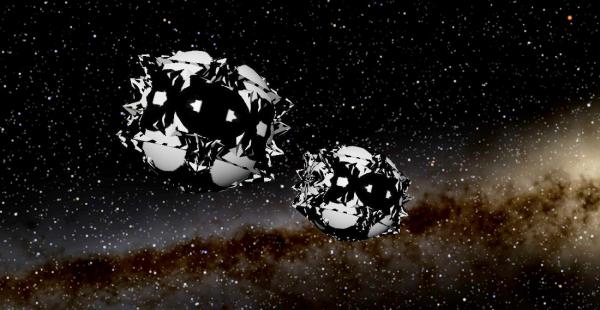BY LETTER
Datahavens
Technology > Application > Infrastructure
Culture and Society > Cultural Factors > Knowledge and Information
Culture and Society > Myths and the Unexplained > Myths and Rumours
Culture and Society > Cultural Factors > Knowledge and Information
Culture and Society > Myths and the Unexplained > Myths and Rumours
Repository for long-term storage of information | |
 Image from Steve Bowers | |
| Two datahavens in the Oort cloud of YTS-55010-1191, near the Sco-Cen association | |
Datahavens of one sort or another have been a feature of Terragen civilization since the very dawn of the Information Age, and continue to serve a vital role even today.
Very broadly, a datahaven is a place where for some fee or other consideration information that might be otherwise be confiscated, erased, or modified by hostile persons or organizations is stored, and guarded against those dangers for some future use. Unlike the archives of an institute, megacorp, or polity, a datahaven is a special-purpose operation, and typically open to a variety of clients.
The information in a datahaven is typically encrypted, and has a variety of legal, physical, and software protections, and the locations of datahavens are either in jurisdictions fundamentally friendly to such activity or else, with suitable defenses or camouflage, in lawless or neutral regions. The actual purpose and content of the information in a datahaven might be almost anything. Most typically it is information that is for one reason or another considered to be illegal or immoral or is otherwise endangered in the region of its origin: data that run counter to the current accepted truths, purloined information of almost any kind, financial records of illegal operations, collections of censored fiction or of actual events that are deemed to be disgusting and repugnant at the point of origin, personal diaries or even whole backups of persons who believe they are under threat where they live, samizdats, blackmail material, and so on. Sometimes a datahaven is used by persons or organizations that are legitimate by all local standards but are living under risky circumstances and lack the resources to store a secure external backup themselves. More often though the content itself is morally or legally suspect, if only by some disputable local standard.
Beyond their basic purpose and operations, datahavens are highly diverse. Some are open to all comers, while others have a limited clientele. Some are open and public about their operations, advertising themselves as honest brokers, while others are highly secretive, the better to serve their function. Some make copies of their data available on request, or even broadcast it, while others permit access only to their clients.
The fidelity and accuracy of the material in a datahaven is highly variable. Almost since their inception it has been a common tactic in memetic warfare to plant disinformation in a datahaven, or to manipulate it while it is in situ, and for just as long it has been the habit of those who would discredit the contents to suggest this is exactly what has happened. The secrecy that is more often than not a part of a datahaven's operations makes verification of claims much more difficult than it would be for more public, albeit malleable, records. Powerful organizations may have an interest and influence on datahavens. What is more, a datahaven operated by beings of any given toposophic level can certainly be breached and the contents manipulated by beings of any higher toposophic level who believe it is worth the effort to do so. A famous early example of this is the targeting of the early primitive datahavens of the Interplanetary Age in the opening phases of the Technocalypse. The several warring factions among the polities of the day, the most prominent Deletionists of the age (especially the Apostles of the New Light), and of course some of the then-hidden First Toposophic entities are all known to have targeted datahavens for elimination or modification. Finally datahistorians consider it highly probable that GAIA accessed and modified to Her preferences all of the surviving information in any case.
In the time since, as the Terragen Sphere has expanded and become more diverse, it is thought that datahavens are collectively more secure from such wholesale meddling, though of course any one particular datahaven might be vulnerable. For this reason those who wish higher security send their information to several widely scattered datahaven operations.
Related Articles
- Data Media
- Deletionism
- Information - Text by M. Alan Kazlev
A sequence of data that is meaningful in a process, such as the DNA code of an organism or the bits in a computer program. Information is the opposite of noise. - Oort Vault - Text by Anders Sandberg
Data storage systems on the edge of a solar system, holding inactive data in storage for future use. A common repository for inactive virch entities, planetary archives and long range statistics.
Appears in Topics
Development Notes
Text by Stephen Inniss
Initially published on 06 March 2017.
Initially published on 06 March 2017.






